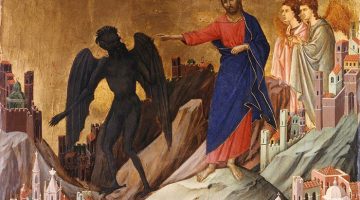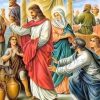 The relationship between the truths of the Christian faith, and the Christian way of life, has fallen into great disrepair in modern times. At its core, the Protestant Reformation was focused on this relationship. In the contemporary world, our idea of faith itself has become anemic. One is a Christian if they believe that certain propositions are true. This reduces the last judgment to a true/false test, in which correct answers gain one eternal life. This misunderstanding then generates a whole series of debates regarding exactly which propositions, and how many, are absolutely required for salvation, or to be a Christian, and which ones and how many can be held in disagreement. In those areas where it has been decided that disagreement can be allowed, there is further debate as to what options are acceptable for Christians in general, or Orthodox Christians in particular, to hold. Further, being able to identify as a Christian and salvation are identified as being the same thing. In academic circles, following the structure of philosophical disciplines which separate ethics or moral philosophy from metaphysics, we have separated dogmatic theology on the one hand and moral theology on the other, such that we can debate how the two relate to each other. This entire web of presuppositions, definitions, and distinctions, however, is completely foreign to the faith and life described by the holy scriptures. This means that it is completely foreign to the faith and life of human persons who have followed God from the origins of humanity until the end of the first century AD. Further, it is utterly foreign to the way of life and faith of the Fathers who understood the world with the same mind as that expressed in the scriptures. This is not to say that these are new beliefs. Rather, it is a new thing that these beliefs are believed to be constitutive of Christianity.
The relationship between the truths of the Christian faith, and the Christian way of life, has fallen into great disrepair in modern times. At its core, the Protestant Reformation was focused on this relationship. In the contemporary world, our idea of faith itself has become anemic. One is a Christian if they believe that certain propositions are true. This reduces the last judgment to a true/false test, in which correct answers gain one eternal life. This misunderstanding then generates a whole series of debates regarding exactly which propositions, and how many, are absolutely required for salvation, or to be a Christian, and which ones and how many can be held in disagreement. In those areas where it has been decided that disagreement can be allowed, there is further debate as to what options are acceptable for Christians in general, or Orthodox Christians in particular, to hold. Further, being able to identify as a Christian and salvation are identified as being the same thing. In academic circles, following the structure of philosophical disciplines which separate ethics or moral philosophy from metaphysics, we have separated dogmatic theology on the one hand and moral theology on the other, such that we can debate how the two relate to each other. This entire web of presuppositions, definitions, and distinctions, however, is completely foreign to the faith and life described by the holy scriptures. This means that it is completely foreign to the faith and life of human persons who have followed God from the origins of humanity until the end of the first century AD. Further, it is utterly foreign to the way of life and faith of the Fathers who understood the world with the same mind as that expressed in the scriptures. This is not to say that these are new beliefs. Rather, it is a new thing that these beliefs are believed to be constitutive of Christianity.
The relationship between the truth of who God is and how human persons must live in relationship to his reality is made plain in the covenantal structure of the very first portion of the scriptures, the Pentateuch or Torah. The covenants follow a pattern well known in the second millennium BC, exemplified in a number of Hittite treaties recovered in archaeological excavations. The ‘Ten Words’ or ‘Ten Commandments’ of Exodus 20 and Deuteronomy 5 exemplify this pattern. In these covenants, the issuer of the covenant, the king, identifies himself, and describes what he has done, chiefly in regard to military victories, on his vassal’s behalf. He then outlines what the vassal’s duties will be henceforth in light of who the king is and what he has done. And so, in Exodus 20, we see that God identifies himself as, “Yahweh, your God, who brought you out of Egypt, out of the land of slavery” (v. 2). He names himself, speaks of his victory over Pharaoh and the gods of Egypt, and of the fact that he has given the Israelites their freedom. He then proceeds to give the ten words, which describe how those for whom he has done these things will live. All of the law is grounded in this way in the identity and mighty acts of God. Throughout the Holiness Code of Leviticus, we are told to ‘Be holy because I, Yahweh your God, am holy” (Lev 11:44-45, 19:2, 20:7, 1 Pet 1:16). The command to love the foreigner and the stranger as the native born is grounded in the reality that Israel were slaves in Egypt, and God delivered them, and in the identity of God (Lev 19:34).
Because the apostles saw the revelation of God in Christ as the continuation and fulfillment of what came before, the new covenant as the ‘filling up’ of the patterns of the Old, we see this same pattern throughout the New Testament. The reality of who Jesus Christ is, and what he has done on our behalf, both his victory over the powers of sin and death and hell, and his redemption of us, setting us free, are proclaimed. This proclamation then entails a way of life for us as recipients of the benefits of Christ our king as members of his kingdom. In St. Paul’s epistles, this understanding is built into their very structure. In each, there is a transition from a teaching, or doctrinal, or dogmatic opening to a practical or pastoral closing, generally set off by the preposition ‘therefore’ (cf. Rom 12:1, 1 Cor 4:6, Col 3:12). Christianity, in its earliest days, we are told in the Acts of the Apostles, was not considered a collection of intellectual beliefs or doctrinal propositions, but a way of living in the world (9:2, 24:14). The Christian religion is a way of living our lives together in community, with Christ in our midst.
In his epistle, St. James speaks directly to those who would seek to sever the acceptance of certain doctrinal propositions from their way of life. The Jewish people had one central dogma, the profession of the Shema, “Hear, O Israel, Yahweh, your God, Yahweh is one” (Deut 6:4). Immediately following the statement of this doctrinal truth is the commandment, “You will love the Lord your God with all your heart, and with all your soul, and with all your might” (6:5). Christ himself cites both this truth, and the resultant commandment, in summary of the entirety of the Old Testament scriptures (Mk 12:29). St. James, however, points out, “You believe that God is one? You do well. But even the demons believe, and shudder” (Jam 2:19). The demons not only believe, but know, that God is the Holy Trinity. They know that Jesus Christ is the second divine person of the Holy Trinity who took upon himself human nature for our salvation. The devil himself knows from bitter experience that Christ died on the cross and rose again on the third day. They doubt none of these things. What they refuse is to live, to exercise their being, in conformity with the truth of the Triune God and his creation.
The rebellion of the devil and his angels, therefore, is not one of doubt. It is not a refusal to accept certain truths. Their rebellion is a metaphysical rebellion. It is a rebellion against what is, what exists, and what is true. This is why moral rebellion always brings about destruction. And since the beginning, the devil and his followers have sought to persuade humans to join in their rebellion. Not to reject certain principles, but to reject their consequences in how we should then live. Because he rebels against truth, the devil is a liar from the beginning. Because this rebellion brings about destruction, he is a murderer from the beginning (Jn 8:44). When he approaches Eve in Eden, he does not engage in a discussion about who God is, but rather in what that means regarding how humanity ought to live in God’s creation (Gen 3:1-5). Belief without life, faith without works, is worse than just a dead corpse. The man who knows the truths of God in Christ and does not live by them, and encourages others to do the same, is self-condemned.
Though it has become common in our day to think that Christians ‘go to heaven’ and non-Christians ‘go to hell’, you will find none of this in scripture or the Fathers. Certainly, one finds the teaching of the last judgment, and that there are those who, in the resurrection, will have eternal life in the presence of Christ, and those who rise to eternal condemnation. But the criteria of this judgment is never laid out as the acceptance of a series of doctrinal propositions or identifying in some way as a Christian. Rather, the criteria is always the life lived by each person, their words and deeds, which are inextricably related to what faith really is. In fact, everywhere in the scriptures, it is God’s own people, first Israel and then the Church, who are threatened with eternal judgment. It is rebellious Christians who are threatened with being cast into the lake of fire prepared for the devil and his angels (Rev 20:11-15). The goats who depart into condemnation all recognize Jesus as their Lord just as the sheep do (Matt 25:31-46). It is the one who knows and does not obey the commandments, and teaches others to do the same who is least (Matt 5:19). It is not the outsider or the ignorant who is in danger of the fires of hell, it is the one who knows the truths of Christ, knows the truth of who God is, and what he has done, knows his commandments, and refuses to submit his life to this reality. From him who has been given much, much will be required. And we as Orthodox Christians have been given much more than most in our inheritance of holy tradition.
We as human persons have received one great blessing which the devil and the demons lack. We have been given this life for repentance. While we have been guilty of sin and rebellion as deep as any evil spirit, while we have used our God-given powers of reason to seek to justify ourselves and our wickedness so that we can continue to fulfill our desires under the cover of outward faith, Christ has extended to us forgiveness. That we are subject to change means that we can change for the better. Christ has brought us healing and restoration. Even more, he has opened to us a way of life which will transform us into the likeness of himself, through living our lives, through acting in accordance with the reality of who he is and the world which he has created in which to dwell with us. As long as we still live, it is not too late for us to begin anew.
















